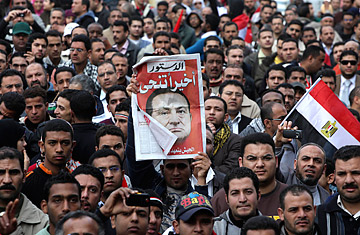
An Egyptian holds up newspaper fronted with a picture of former President Hosni Mubarak and the Arabic headline, "Finally he steps down", at Tahrir Square in Cairo, Egypt, Saturday, Feb. 12, 2011.
If Egypt's military coup d'etat turns out badly, one thing we can count on is years of finger pointing in Washington under the banner of "Who lost Egypt?" But there will also be the question why the CIA failed to predict events there.
The first, obvious explanation is that the wars in Iraq and Afghanistan have been a giant black hole sucking in CIA operatives and resources from around the world. The exact figure is classified, but I'd guess a fully two thirds of CIA officers overseas are tied up in the "war on terror". Who had time for a populist revolt in Egypt? But the problems run deeper than that.
As Mubarak's regime started to unspool at the beginning of February, CIA Director Leon Panetta was in the middle of endorsing a plan to reform the way CIA operatives work overseas. It's called "CIA 2015," and at its heart it makes assigning operatives overseas more "flexible." One day an operative could be in Kabul chasing the Taliban, the next day her or she could be in Caracas trying to figure out what's going on in the mind of President Hugo Chavez. Operatives will be trained and prepared to parachute into the crisis du jour. Behind it is the CIA's notion that the world is flat — if a potential source doesn't speak English he's not worth the time. And anyhow who wants to spend a career on a country or part of the world that may never make it to the front burner? That's no way to climb the career ladder.
The implication of Panetta's proposed changes, getting back to Egypt, is that the CIA will no longer be an Arabist focused on Egypt for an entire career, relying on him or her to explain what's going on when the place starts circling the drain. And the problem created by that approach has already been evident in Egypt. The CIA doesn't have operatives on the ground who've spent a career getting a sense of the country, recruiting confidential sources, and collecting a Rolodex of contacts to alert him when the street's about to explode or the military's about to take over. And there's definitely no time to develop the all-important sense of what's going on inside the Egyptian Muslim Brotherhood. That kind of depth you can only acquire with years spent in-country.
Or let me put it this way: To be effective in a country as complicated country as Egypt is, an operative should plan to spend two years in training, a year on the desk, and two years learning Egyptian Arabic, which needs to be followed by three to five years in Egypt perfecting it. Add two three-year tours to Cairo or Alexandria, and we're already up to half an operative's career.
I know the counter-argument: Technology. We can tap into the Egyptians' Twitter messages and Facebook pages, and we'll know all we need to. But, honestly, that's a window into how many Egyptians? Ten percent is overly optimistic, and that means we're blind to what something like the other 70 million Egyptians are thinking. And that's not to mention that Mubarak and his generals — the people calling the shots today — don't tweet.
If the Middle East does go up in flames, or democracy flowers, and Washington's only window into the fast-changing situation is via Qatar's Al Jazeera news network, we can thank the CIA decision it can dispense with expertise and area knowledge. The Harvard Business School approach to management — if you can run Disneyland you can run GE — just doesn't work in places like Egypt.
Baer, a former Middle East CIA field officer, is TIME.com's intelligence columnist and the author of See No Evil and, most recently,The Devil We Know: Dealing with the New Iranian Superpower.
